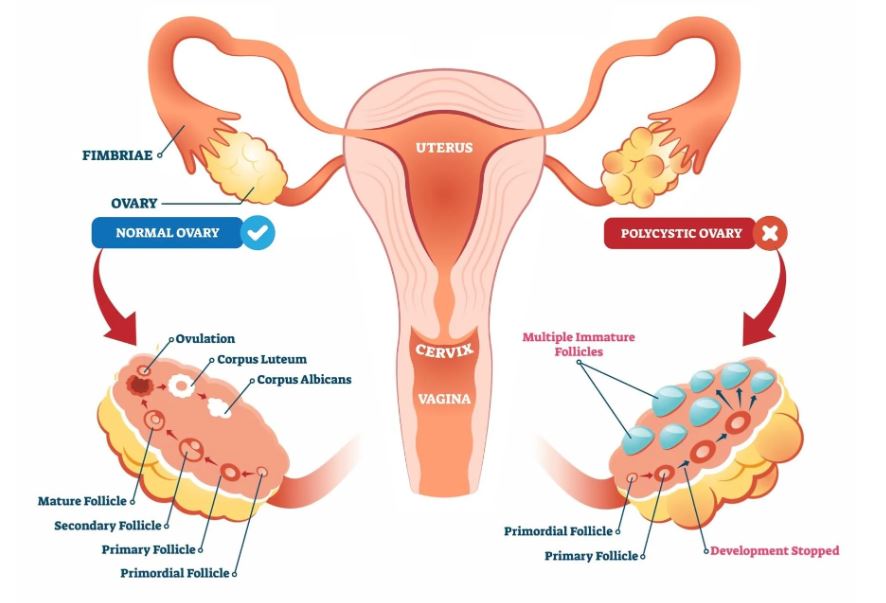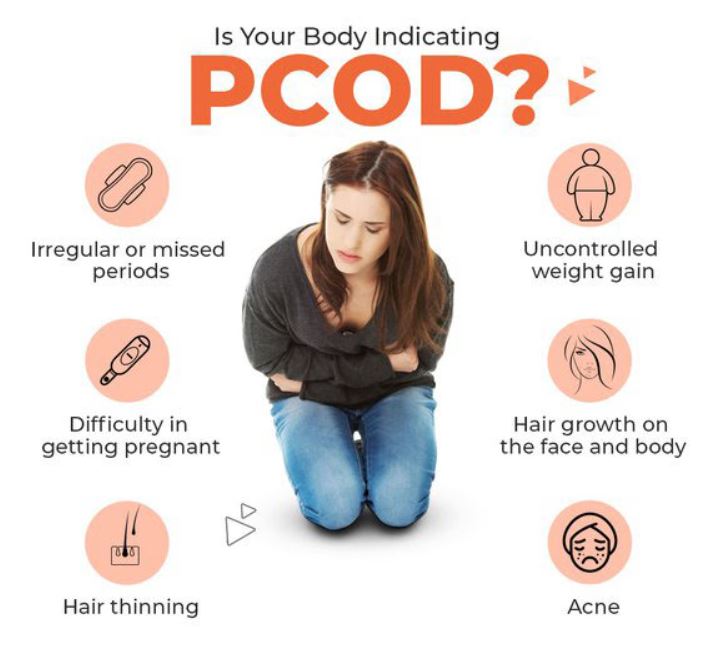Polycystic Ovary Disorder (PCOD), is a prevalent hormonal disorder that affects many women worldwide. Almost 10% of women in the world is suffering from PCOD/PCOS. PCOD is characterized by a combination of symptoms, including irregular menstrual cycles, high levels of androgen hormones, and the presence of multiple small cysts in the ovaries. This article aims to provide a comprehensive overview of PCOD, its causes, symptoms, and available treatment options.
What is PCOD?
In medical term full form of PCOD is Polycystic Ovary Disorder.
PCOD (Polycystic Ovarian Disease), is a medical condition in which by the production of immature or partially mature eggs in large quantities, which eventually develop into cysts in the ovaries. This leads to an enlargement of the ovaries and an excessive secretion of male hormones (androgens), resulting in various symptoms such as infertility, irregular menstrual cycles, abnormal hair growth on face, hair loss and abnormal weight gain. However, PCOD can be effectively managed through dietary and lifestyle modifications.
Due to hormonal imbalance in PCOD, these condition can trigger in women’s health
- Diabetes
- Infertility
- Acne
- Excessive hair growth

What is difference between PCOS and PCOD?
Polycystic ovary syndrome (PCOS) and polycystic ovarian disease (PCOD) are two commonly misunderstood conditions.
click here for more information about the differences.
Causes and Risk Factors
The exact cause of PCOD remains unknown, but researchers believe it is a complex interplay of genetic and environmental factors. Some common risk factors associated with PCOD include:
- Hormonal Imbalance: PCOD is primarily caused by an imbalance in sex hormones, particularly an increase in androgens (male hormones) such as testosterone.
- Insulin Resistance: Insulin is a hormone that helps regulate blood sugar levels. Insulin resistance, a condition in which the body’s cells become less responsive to insulin, can contribute to the development of PCOD.
- Hereditary Factors: PCOD may run in families, suggesting a genetic component to the disorder.
Symptoms
PCOD can vary differently in each individual, and the severity of symptoms can also vary. Some common signs and symptoms of PCOD include:
- Irregular Menstrual Cycles: Women with PCOD often experience irregular, infrequent, or prolonged menstrual cycles. Some may even have missed periods.
- Excessive Hair Growth: Increased androgen levels can lead to unwanted hair growth on the face, chest, back, or other areas of the body.
- Acne and Oily Skin: Hormonal imbalances can cause acne breakouts and oily skin.
- Weight Gain: Many women with PCOD struggle with weight gain or find it challenging to lose weight.
- Mood Swings: Hormonal fluctuations can affect mood, leading to mood swings, irritability, or depression.
- Infertility: PCOD is one of the leading causes of infertility in women due to irregular ovulation.

Treatment Options
While there is no cure for PCOD, there are various treatment options available to manage the symptoms and improve overall well-being. Treatment may include:
- Lifestyle Modifications: Adopting a healthy lifestyle by maintaining a balanced diet, regular exercise, and managing stress levels can help to reduce symptoms. If you are able to manage your weight then you are in successful phase of treatment. Because weight loss is a Key Component of Treating PCOD . Click here for how it is important to manage weight in PCOD.
- Hormonal Birth Control: Oral contraceptives can regulate menstrual cycles, reduce androgen levels, and control acne.
- Anti-Androgen Medications: These medications can help reduce excessive hair growth and acne by blocking the effects of androgen hormones.
- Insulin-Sensitizing Medications: For women with PCOD and insulin resistance, certain medications can improve insulin sensitivity and regulate hormone levels.
- Fertility Treatments: Women trying to conceive may require assisted reproductive techniques, such as ovulation induction , Intrauterine insemination (IUI) or in vitro fertilization (IVF) in most sever cases.
Conclusion
PCOD is a common hormonal disorder that affects women of reproductive age. Its symptoms can vary widely and may impact fertility and overall quality of life. Early diagnosis, lifestyle modifications, and appropriate medical interventions can help manage the symptoms effectively. If you suspect you have PCOD or are experiencing any related symptoms, it is important to consult with a healthcare professional for accurate diagnosis and personalized treatment.
Table of Contents
Related Article:

